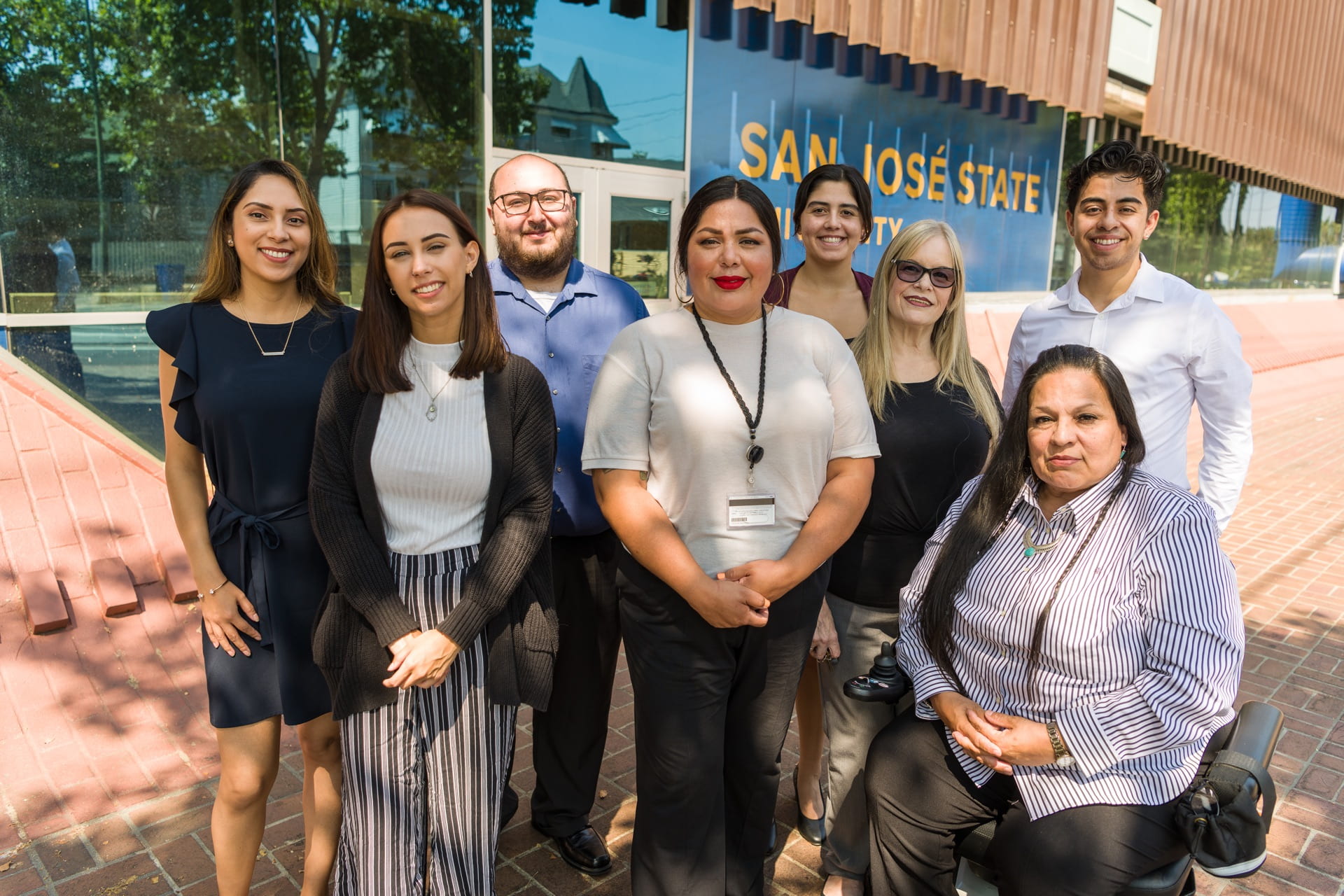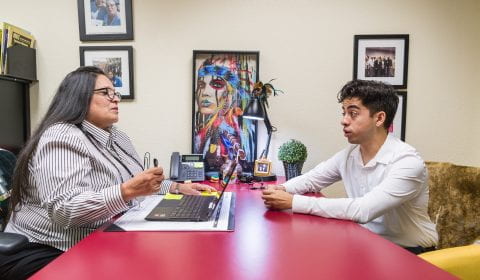The Record Clearance Project Maintains Impressive 99% Success Rate in Court Throughout Pandemic

The Record Clearance Project staff includes, from left to right: Cindy Parra, Jordan Velosa, ’20 Justice Studies; Jesse Mejia, ’19 Justice Studies; Darlene Montero; Michelle Taikeff, ’19 Justice Studies; Victoria Kirschner; Omar Arauza, ’20 Justice Studies; and Diana Carreras. Photo by Bob Bain.
This fall, the Record Clearance Project (RCP) kicks off its 14th year of service at San José State.
“Having a criminal record is often a major obstacle to employment for low-income residents in San José, and this challenge is amplified for people of color,” said College of Social Sciences Dean Walt Jacobs.
“The Record Clearance Project assists thousands of people each year with criminal convictions who cannot afford an attorney, enabling them to pursue their legal rights to a full, productive future. SJSU students also benefit from participation in this critically important work, as they learn valuable skills that translate to their areas of study.”
The program offers representation in court on petitions to dismiss eligible convictions and reduce eligible felonies to misdemeanors in Santa Clara County. Students interview clients and prepare their petitions in the appropriate legal format. Students also offer free “speed screenings” to help members of the public understand their individual legal rights to clearing their record.
SJSU Justice Studies instructor and attorney Margaret (Peggy) Stevenson launched the RCP as a series of justice studies courses and an internship program that provides undergraduates with the training and attorney supervision to help eligible individuals get their records cleared as allowed by law, also known as expungement.
Since launching the RCP in 2008, Stevenson and her team have spoken to nearly 13,000 people, including 4,000 in custody, explaining expungement law and employment rights of people with convictions at legal rights presentations. Throughout the pandemic, the RCP has pivoted to online services, continuing to consult with clients virtually.
“Our justice system takes people who have made a mistake in their past and condemns them to limited employment, limited housing and limited education for the rest of their lives,” said Stevenson. “It takes sophistication, knowledge, experience and kindness to interview our clients, share their stories and advocate for them.”
To help people begin the expungement process, the RCP obtained a LiveScan machine in 2017. Since then, the RCP has provided more than 800 people with their histories, saving them at least $31,500 in commercial services, and received court decisions that removed over $130,000 in debt.
In addition to the financial benefit, providing a safe, friendly environment alleviates some of the trauma many people experience in being fingerprinted again.

Peer mentor Diana Carreras and project assistant Omar Arauza in the RCP office at San José State. Photo by Bob Bain.
Stevenson has trained SJSU students to conduct over 2,100 individual legal advice interviews and helped them file more than 1,700 petitions to dismiss convictions on behalf of over 600 clients. The training, practice and role-play pays dividends: The RCP has an impressive 99% success rate in court.
That success is exponential, says RCP alumna Serey Nouth, ’20 Kinesiology. She explained that helping clients made it easier to address her own struggles and gave her hope for the future.
“Every day, we hear and see injustice, inequality, and systemic racism in our justice system,” she said. “Once hopeless and dejected, I now feel more empowered to dedicate my life to becoming part of the solution to these long overdue issues.
“Every time I get to work with a new client, it’s another life changed for the better. Thanks to RCP, I am now studying for my LSAT and preparing my application for law school.”
Stevenson said that the RCP will continue to hold speed screenings online or by phone, and this fall they will be offering some legal rights presentations via video, enabling access to clients across the state.
“There are 78 RCP cases on the court docket in August,” she added. “We filed these cases for 12 clients, including convictions as old as 1986. On we go.”
Related Stories

Day of Remembrance Honors the Past, Present and Future of the Japanese American Community in San José

Deep Dive in Five: Celebrating 25 Years of the Center for Community Learning and Leadership

SJSU to Collaborate with NVIDIA and the City of San José on AI-Focused Innovation Initiatives

